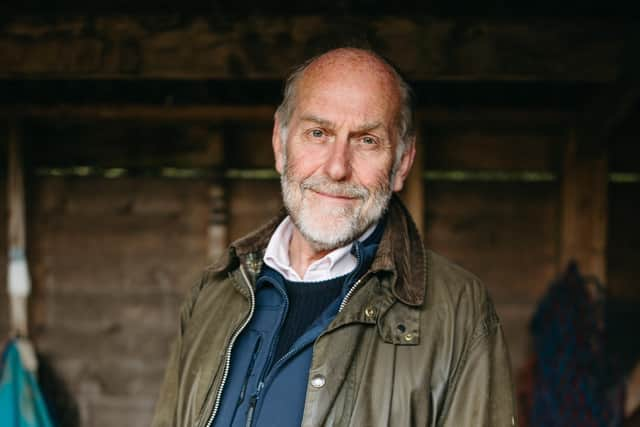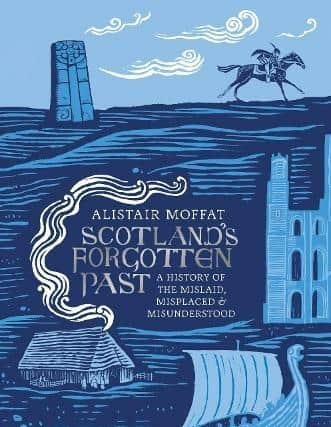Book review: Scotland’s Forgotten Past, by Alistair Moffat
The history of a country is, naturally, a narrative, but, though it may be read as a long and rich novel, there is no plot, and we are more likely to remember it as collection of short stories, often with scarcely any connection between them. What after all links a cave where the bodies of centuries dead decapitated children were found with the Scottish referendum of 2014? Very little, if anything.
This book is part of a series, and the title, while eye-catching, is a bit of a misnomer. Alistair Moffat sensibly pays little heed to it. The 36 episodes in which he treats forgotten or misremembered history include some episodes like the Wars of Independence led by Wallace, Andrew Moray and Robert Bruce which have never been forgotten and are indeed fondly remembered, even if not always accurately. Moffat remarks that Wallace probably spoke Old Welsh though in the film Braveheart Mel Gibson gave him a Glasgow accent or perhaps, I would say, an Australian’s idea of one.
Advertisement
Hide AdThere’s a good chapter on the Picts, not forgotten, just puzzling, so much so that “Scottish historians used to write about the disappearance of the Picts with a palpable sense of relief”.This is not quite how it is now.


Moffat is, as ever, agreeably opinionated on, for instance, the vexed question of the Scots language. It is “probably spoken by more people than either standard English or Gaelic”. Fair enough, even if it is often only standard English with an accent. This, as he points out, shouldn’t surprise; the chapter in which he discusses language is entitled “English Scotland”. Scots is the historical development of Anglian, the northern variety of Old pre-Norman Conquest English, spoken in the eastern Borders, Edinburgh, Fife, Angus and Aberdeenshire. He gives us a sentence in Scots and remarks that it might equally have been spoken by a Newcastle Geordie.
He has an unfashionable admiration for John Knox, especially admiring his insistence that there must be a school and schoolmaster in every parish in the land, even though this wasn’t actually achieved till more than a hundred years after his death. But Knox, less narrow-minded than often supposed, is never again likely to be a cult figure in modern Scotland, the Kirk’s authority having evaporated in the last half-century.
There is an excellent chapter on James Small, the Berwickshire blacksmith who invented the swing-plough which transformed Scottish agriculture. As Moffat writes, “The Scottish Enlightenment was not only a revolution of ideas. At the same time as Adam Smith sat at his desk writing about the wealth of nations, James Small was in his smiddy increasing it.” His revolutionary ploughs, manufactured at the Carron Ironworks in Falkirk, led also to the development of the Clydesdale, Scotland’s great breed of the heavy horse.
Moffat gives a matching chapter to the Aberdeenshire farmer Willie McCombie of Tillyfour, creator the Aberdeen-Angus, the greatest breed of beef cattle in the world. School children should learn about men like Small and McCombie and Scotland’s agricultural revolution. But I fear that the 18th and 19th centuries are not popular with our educationalists today. It would be good to put this little book on the school curriculum.


Not everything recorded here is a matter for national pride. There is a chapter on “Scotland’s Nazi”, Captain Archibald Ramsay, the disgustingly Jew-hating Unionist MP for Peebles and Midlothian, imprisoned without trial early in the war under the Defence of the Realm Act. Tactfully, there is no mention of the somewhat dubious wartime record of some prominent figures in the SNP, then, admittedly, a tiny and insignificant party.
Advertisement
Hide AdNot everything Scottish is praised here. Moffat’s chapter on the hugely popular TV programme The White Heather Club, starring Andy Stewart, is entitled “The Scottish Cringe”. “It was,” he writes, “a strange, mostly nauseating, version of Scottish Culture.” One sees his point, but I confess I rather liked it – ersatz certainly, but innocent fun.
There’s a good chapter on the great Renaissance play The Three Estates, though the chapter’s title, “Whaur’s yer Wullie Shakespeare Noo?”, belongs properly to the tragedy, “Douglas”, an 18th century play. No matter: The Three Estates was a great satire addressed at what was then the Establishment. We could do with such a play today.
Scotland’s Forgotten Past, by Alistair Moffat, Thames & Hudson, 216pp, £14.99